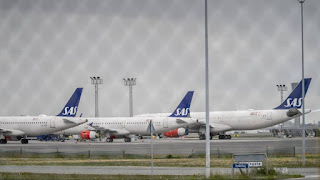Copenhagen’s Kastrup Airport had expected a drop in business during the coronavirus crisis, but its size was a shock. The airport has seen a 95 percent decline in passengers (DK) in comparison with the same period last year, it reported in a press release. Even though Denmark has now opened its borders for travelers from many countries, the airport expects business to be down around 85 percent for the summer. That means a loss of some 1.5 million tourists and business travelers. The decline affects airlines, hotels and restaurants as well.
This trend puts the airport in a “deep crisis,” says business commentator Ole Krohn from TV2 News: “It will be a couple of years before it is back to the same level from before the coronavirus crisis.” The same forecast applies to other airports in Europe.
This trend puts the airport in a “deep crisis,” says business commentator Ole Krohn from TV2 News: “It will be a couple of years before it is back to the same level from before the coronavirus crisis.” The same forecast applies to other airports in Europe.
Photo: Mads Claus Rasmussen © Scanpix.
Thousands waiting for refunds
Meanwhile, SAS, the largest airline in Scandinavia, is swamped with requests for refunds for canceled flights (DK). According to EU rules, airlines are supposed to refund such tickets within seven days, but with thousands of canceled flights and hundreds of staffers sent home, the company cannot keep up with the requests. “For almost three months, we have canceled around 800 flights a day,” says John Eckhoff, the company’s press officer. So far, SAS has given refunds to about 700,000 customers, with about one-third opting for a voucher to use on another flight within 12 months.
According to an estimate from Norway, SAS owes customers about DKK 5 billion (USD 770 million), which is more than the DKK 4.3 billion that the Danish state has contributed to the plan to rescue the company from bankruptcy. Norwegian Airlines, the second-largest airline in the region, is in the same position. It has refunded DKK 3.2 billion to customers.
May miss her father’s funeral
One of the people waiting for a refund is Ingileif Gísladóttir (DK). She had booked five round-trip tickets so that at Easter her family could visit relatives in Iceland, where her father was seriously ill. When the pandemic hit, the flight was canceled, and then to make things worse, her father died on April 7, when her family should have been there with him. Now she is hesitating before buying tickets so that she can attend her father’s funeral because she has no idea when she will receive the refund for the first set of tickets.
“You must fill out a form that was hard to find - it was like a labyrinth tracking it down,” says Gísladóttir. Then it was hard to get hold of a service representative, who was not very helpful. “I think it was bad, bad service.” When asked whether customers would receive their refunds before the end of the year, SAS’s Eckhoff said that he could not give an estimate.
Stranded at dock
Another overlooked class of people who haven’t been able to travel home to see their families is sailors. One of them was Captain Jens Holstrøm Andersen, who went onboard the Pacific Dragon ship in February, expecting to be at sea for only two months. He had been confined on the ship at harbor in Egypt (DK) and elsewhere indefinitely because no countries would let the crew in. Shipping companies were also reluctant to take new crews onboard because of the risk of infection. Some 400 Danes and perhaps a total of 200,000 sailors in the world are in the same situation, says the Lederne Søfart (Maritime Leaders) organization. Holstrøm Andersen was finally able to return to his family because Denmark gave him status as an “essential worker.”
Stranded at dock
Another overlooked class of people who haven’t been able to travel home to see their families is sailors. One of them was Captain Jens Holstrøm Andersen, who went onboard the Pacific Dragon ship in February, expecting to be at sea for only two months. He had been confined on the ship at harbor in Egypt (DK) and elsewhere indefinitely because no countries would let the crew in. Shipping companies were also reluctant to take new crews onboard because of the risk of infection. Some 400 Danes and perhaps a total of 200,000 sailors in the world are in the same situation, says the Lederne Søfart (Maritime Leaders) organization. Holstrøm Andersen was finally able to return to his family because Denmark gave him status as an “essential worker.”

No comments:
Post a Comment